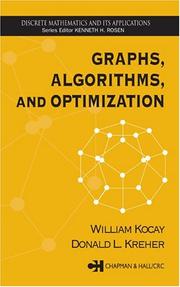| Listing 1 - 3 of 3 |
Sort by
|

ISBN: 1584883960 9781584883968 Year: 2005 Publisher: Boca Raton : Chapman & Hall/CRC,
Abstract | Keywords | Export | Availability | Bookmark
 Loading...
Loading...Choose an application
- Reference Manager
- EndNote
- RefWorks (Direct export to RefWorks)
Graphs, Algorithms, and Optimization is a comprehensive book that features a clear explanation of modern graph theory in a rigorous yet approachable way. Suitable for use as a textbook in either mathematics or computer science courses, it is designed to present graph theory from an algorithmic point of view, allowing for a variety of technical applications. It includes useful programming techniques to solve graph theory problems, and applicable data structures to show how algorithms can be programmed. Additional coverage is provided on discrete optimization and its connection to graph theory, algorithmic complexity and efficiency, NP- completeness, and linear optimization.
Graph algorithms --- Algorithmes de graphes --- Graph algorithms.

ISBN: 3540435506 Year: 2002 Publisher: New York : Springer,
Abstract | Keywords | Export | Availability | Bookmark
 Loading...
Loading...Choose an application
- Reference Manager
- EndNote
- RefWorks (Direct export to RefWorks)
Computer science --- Discrete mathematics --- Graph algorithms --- Algorithmes de graphes --- Graph algorithms.
Book
Year: 2021 Publisher: Santa Monica, Calif. RAND Corporation
Abstract | Keywords | Export | Availability | Bookmark
 Loading...
Loading...Choose an application
- Reference Manager
- EndNote
- RefWorks (Direct export to RefWorks)
During the execution of programs, managers must orchestrate the planning and performance of upwards of tens of thousands of interdependent tasks. Many of these tasks have interdependencies such that failure to meet scheduling expectations in one task can affect the execution of many others. As programs grow larger and the interdependencies of the program activities get complex, tools are needed to introduce more rigor into program management to reduce schedule risk. The Ground Based Strategic Deterrent (GBSD) currently under development — a complete replacement for the aging LGM-30 Minuteman III intercontinental ballistic missile system — is a good example of a large, complex program with numerous interdependent tasks. Given the tight schedule by which GBSD is bound and the numerous organizations participating, it is necessary that the required certification process for nuclear systems proceeds in an efficient manner. In this report, the authors present the underlying rationale behind algorithms already delivered to the GBSD program office that were designed to reduce the likelihood of rework in program execution, provide better insight into schedule risk, and provide insights into how to restructure task dependencies to manage schedule risk. Although the novel methods described in this report were developed for the GBSD program, they are general and can be applied to any program.
Graph algorithms. --- Intercontinental ballistic missiles --- Algorithmes de graphes. --- Missiles balistiques intercontinentaux --- United States. --- United States. --- Procurement --- Automation. --- United States
| Listing 1 - 3 of 3 |
Sort by
|

 Search
Search Feedback
Feedback About
About Help
Help News
News